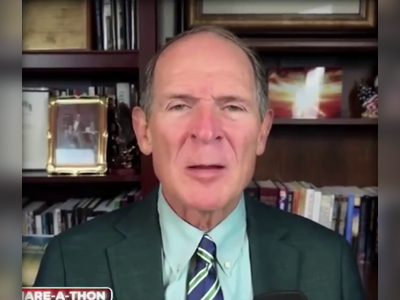
Global Economies Brace for Potential Recession Amidst Inflationary Pressures
Countries worldwide are grappling with rising inflation rates, supply chain disruptions, and geopolitical tensions that could signal an economic downturn.
Several economies around the world are currently experiencing significant inflationary pressures, prompting concerns about an impending recession.
According to recent data, inflation rates in various regions have hit multi-decade highs, driven by a combination of factors including supply chain disruptions, increased energy costs, and the effects of monetary policy shifts.
In the United States, consumer prices surged 8.6% year-on-year as of May 2022, the highest rate since 1981. This spike has been attributed to rising costs in essential goods such as food and fuel, exacerbated by the ongoing conflict in Ukraine which has disrupted grain supplies and raised energy prices globally.
The Federal Reserve has responded by implementing interest rate hikes in an effort to curb inflation, with several increases planned for the coming months.
In Europe, the inflation rate has also reached alarming levels, fueled by soaring energy prices and the impacts of the European Central Bank’s previous monetary easing policies.
The Eurozone's inflation rate was reported at 7.4% in April 2022, leading to calls for tighter fiscal measures.
EU member states are exploring various strategies to mitigate the economic fallout, which includes subsidies for vulnerable populations and measures to enhance energy independence.
In Asia, countries like Japan and China are taking varied approaches to address inflation concerns.
Japan, which has historically struggled with low inflation, is now facing upward pressure as commodity prices rise.
The Bank of Japan has maintained its ultra-loose monetary policy, but economists forecast potential adjustments depending on global trends.
Conversely, China is implementing targeted stimulus measures to bolster its economy amidst lockdowns aimed at controlling COVID-19 outbreaks, striving to avoid inflation while fostering growth.
Emerging markets are also feeling the strain, with many reporting double-digit inflation rates.
Countries in Latin America, such as Argentina and Brazil, have implemented aggressive monetary policies to combat soaring prices, yet face challenges due to external factors like fluctuating commodity prices and currency volatility.
Geopolitical tensions have further complicated economic forecasts.
The ongoing conflict in Eastern Europe, particularly Russia's invasion of Ukraine, has prompted sanctions that have impacted global food and energy supplies.
This situation has created a ripple effect, influencing market stability and contributing to heightened uncertainty in financial environments worldwide.
Market analysts suggest that the convergence of elevated inflation rates, geopolitical instability, and significant monetary policy shifts could lead to a global economic slowdown, which many are closely monitoring.
Various financial institutions are revising growth forecasts downward, reflecting increasing apprehension about the potential for recessionary conditions across multiple economies.
According to recent data, inflation rates in various regions have hit multi-decade highs, driven by a combination of factors including supply chain disruptions, increased energy costs, and the effects of monetary policy shifts.
In the United States, consumer prices surged 8.6% year-on-year as of May 2022, the highest rate since 1981. This spike has been attributed to rising costs in essential goods such as food and fuel, exacerbated by the ongoing conflict in Ukraine which has disrupted grain supplies and raised energy prices globally.
The Federal Reserve has responded by implementing interest rate hikes in an effort to curb inflation, with several increases planned for the coming months.
In Europe, the inflation rate has also reached alarming levels, fueled by soaring energy prices and the impacts of the European Central Bank’s previous monetary easing policies.
The Eurozone's inflation rate was reported at 7.4% in April 2022, leading to calls for tighter fiscal measures.
EU member states are exploring various strategies to mitigate the economic fallout, which includes subsidies for vulnerable populations and measures to enhance energy independence.
In Asia, countries like Japan and China are taking varied approaches to address inflation concerns.
Japan, which has historically struggled with low inflation, is now facing upward pressure as commodity prices rise.
The Bank of Japan has maintained its ultra-loose monetary policy, but economists forecast potential adjustments depending on global trends.
Conversely, China is implementing targeted stimulus measures to bolster its economy amidst lockdowns aimed at controlling COVID-19 outbreaks, striving to avoid inflation while fostering growth.
Emerging markets are also feeling the strain, with many reporting double-digit inflation rates.
Countries in Latin America, such as Argentina and Brazil, have implemented aggressive monetary policies to combat soaring prices, yet face challenges due to external factors like fluctuating commodity prices and currency volatility.
Geopolitical tensions have further complicated economic forecasts.
The ongoing conflict in Eastern Europe, particularly Russia's invasion of Ukraine, has prompted sanctions that have impacted global food and energy supplies.
This situation has created a ripple effect, influencing market stability and contributing to heightened uncertainty in financial environments worldwide.
Market analysts suggest that the convergence of elevated inflation rates, geopolitical instability, and significant monetary policy shifts could lead to a global economic slowdown, which many are closely monitoring.
Various financial institutions are revising growth forecasts downward, reflecting increasing apprehension about the potential for recessionary conditions across multiple economies.
AI Disclaimer: An advanced artificial intelligence (AI) system generated the content of this page on its own. This innovative technology conducts extensive research from a variety of reliable sources, performs rigorous fact-checking and verification, cleans up and balances biased or manipulated content, and presents a minimal factual summary that is just enough yet essential for you to function as an informed and educated citizen. Please keep in mind, however, that this system is an evolving technology, and as a result, the article may contain accidental inaccuracies or errors. We urge you to help us improve our site by reporting any inaccuracies you find using the "Contact Us" link at the bottom of this page. Your helpful feedback helps us improve our system and deliver more precise content. When you find an article of interest here, please look for the full and extensive coverage of this topic in traditional news sources, as they are written by professional journalists that we try to support, not replace. We appreciate your understanding and assistance.










